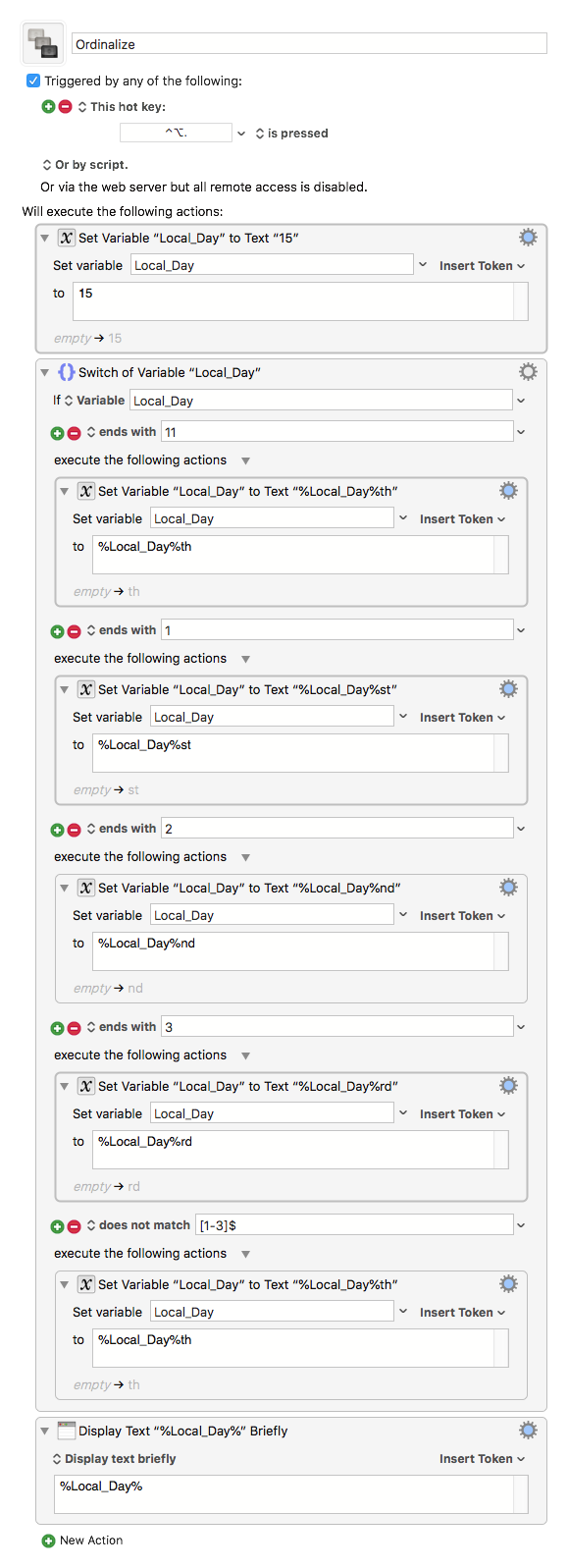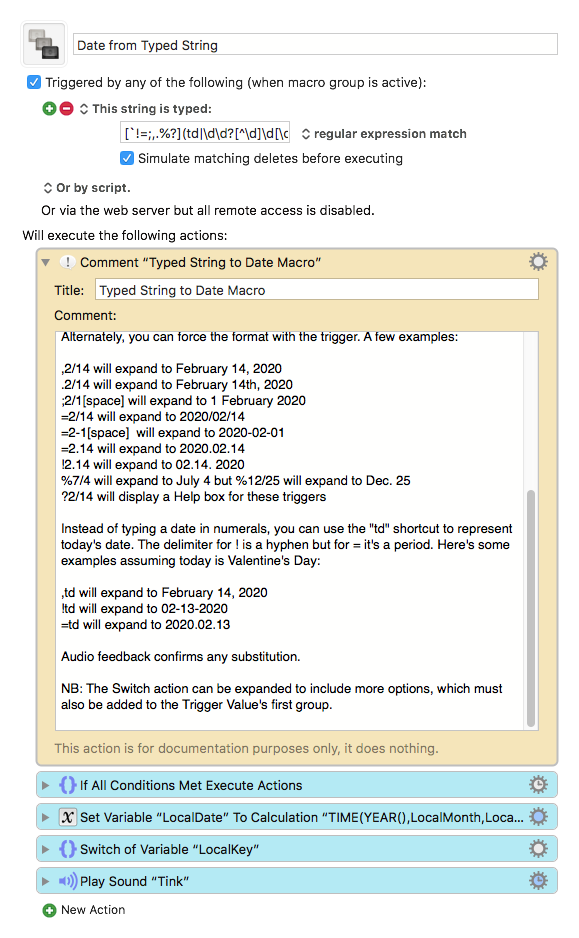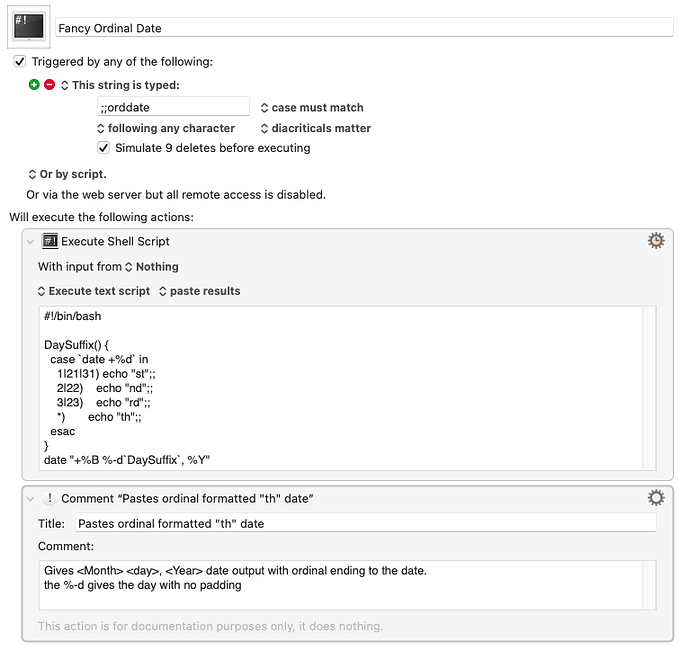I would like to type a text string, such as ,,today to format today's date, such as: April 11th, 2020 - the key is the th or st or nd depending on the date.
Ideally, I would also like to add a modifier where I could type ,,today+1 or ,,today+4 and automatically count forward. But that is a separate request and I feel like I could do that on my own once I get the key substitution into the macro.
I have a text expander snippet (shell script) that does this, but it has a menu associated with it demanding user input after the text string. I would like to have something default to expand today's date in the format above and then potentially modify that afterward as mentioned.
Here is the script I have from Bret Terpstra:
#!/usr/bin/ruby
datestring="%filltext:name=Date String:default=today%"
format="%fillpopup:name=Format:default=long%"
### Convert Date action
### Copyright 2013 Brett Terpstra <http://brettterpstra.com>
### Freely distribute and edit, but please maintain attribution
require 'Time'
class DateUtils
def initialize(time_zone = 'America/Chicago')
@time_zone = time_zone
end
def parsedate(date,format,unpad=false)
date = Time.parse(%x{php -r "date_default_timezone_set('#{@time_zone}');echo strftime('%c',strtotime('#{date}'));"})
parsed = date.strftime(format).gsub(/%o/,"#{ordinal(date.strftime('%e').to_i)}")
parsed.gsub!(/(^|-|\/|\s)0/,"\\1") if unpad
# if there's no space between time and meridiem, downcase it
parsed.gsub!(/(\d)(AM|PM)/) {|m| $1 + $2.downcase }
return parsed =~ /1969/ ? false : parsed
end
# Returns an ordinal number. 13 -> 13th, 21 -> 21st etc.
def ordinal(number)
if (11..13).include?(number.to_i % 100)
"#{number}th"
else
case number.to_i % 10
when 1; "#{number}st"
when 2; "#{number}nd"
when 3; "#{number}rd"
else "#{number}th"
end
end
end
def timeize(time_string,format)
# Uses standard strftime format, but %0I will pad single-digit hours
if time_string =~ /(\d{1,2})(?::(\d\d))?(?:\s*(a|p)m?)?/i
hour = $1.to_i
minute = $2.nil? ? "00" : $2.to_i
meridiem = $3
meridiem = hour > 12 ? "p" : "a" if meridiem.nil?
format.gsub!(/%H/) {|m|
hour = hour < 12 && meridiem == "p" ? hour + 12 : hour
hour = 0 if hour == 12 && meridiem == "a"
hour < 10 ? "0" + hour.to_s : hour
}
format.gsub!(/%(0)?I/) {|m|
hour = hour > 12 ? hour - 12 : hour
$1 == "0" && hour < 10 ? "0" + hour.to_s : hour
}
format.gsub!(/%M/,minute.to_s)
format.gsub!(/%p/,meridiem.downcase + "m")
format.gsub!(/%P/,meridiem.upcase + "M")
end
format
end
end
original = format + " " + datestring
# split input and handle thursday@3 format
input = original.gsub(/(\S)@(\S)/,"\\1 at \\2").split(" ")
unpad = true
du = DateUtils.new
# %%o is replaced with ordinal day
format = case input[0]
when 'date' then '%m/%d/%y' # slashed date
when 'local' then '%F' # localized date
when 'short' then '%a, %b %%o, %Y' # abbreviated full date
when 'long' then '%B %%o, %Y' # long full date
when 'iso' then '%Y-%m-%d'
else false
end
# turn off leading zero removal for certain types
unpad = false if input[0] =~ /(date|local|iso)/
# handle +# to advance # days
input.map! {|part|
part.gsub(/^\+(\d+)$/,"\\1 days").gsub(/^at$/,'')
}
# time formatting
time_format = ""
time_string = ""
if original.gsub(/\+\d+/,'') =~ /((?:at|@) *)?(\d{1,2}(:\d\d)?(\s*(a|p)m?)?)/i
time_string = $2
time_format = case input[0]
when 'iso' then du.timeize(time_string," %H:%M")
when 'long' then du.timeize(time_string," at %I:%M%p")
else du.timeize(time_string," %I:%M %P")
end
input.delete_if { |item|
item =~ /^(@|at|@?\d{1,2}(:\d\d)?((a|p)m?)?|((a|p)m?))$/i
}
end
date_string = ""
if format
if input.length > 1
if original.gsub(/((@|at)\s*)?#{time_string}/,'') =~ /^[\s\n]*$/m
date_string = "today #{time_format}"
else
date_string = input[1..input.length].join(" ")
end
else
date_string = "today"
end
else
if original.gsub(/((@|at)\s*)?#{time_string}/,'') =~ /^[\s\n]*$/m
date_string = "today #{time_format}"
else
date_string = input.join(" ")
end
unpad = false
format = '%F'
end
output = du.parsedate(date_string,format + time_format,unpad)
if output
print output
else
print original
end


